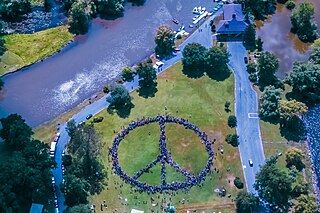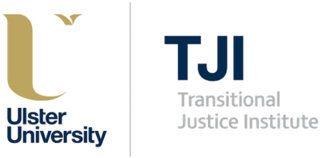
The University for Peace (UPEACE) is an international university and intergovernmental organization established as a treaty organisation by the United Nations General Assembly in 1980. The university offers postgraduate, doctoral, and executive programmes related to the study of peace and conflict, environment and development, and international law.

The Ulster University Derry~Londonderry campus is one of the four campuses of Ulster University. It is located in Derry, County Londonderry, Northern Ireland and opened in 1865 as a Presbyterian Christian arts and theological college. Since 1953, it has had no religious affiliation and provides a broad range of undergraduate and postgraduate academic degree programmes in disciplines ranging from business, law, social work, creative arts & technologies, cinematic arts, design, computer science and computer games to psychology and nursing.
The Combined Loyalist Military Command is an umbrella body for loyalist paramilitary groups in Northern Ireland set up in the early 1990s, recalling the earlier Ulster Army Council and Ulster Loyalist Central Co-ordinating Committee.

Monica Mary McWilliams is a Northern Irish academic, peace activist, human rights defender and former politician.

Dr. James E. Waller is a widely recognized scholar in the field of Holocaust and genocide studies, and the inaugural Cohen Professor of Holocaust and Genocide Studies at Keene State College located in Keene, New Hampshire.

CAIN is a database containing information about Conflict and Politics in Northern Ireland from 1968 to the present. The project began in 1996, with the website launching in 1997. The project is based within Ulster University at its Magee campus. The archive chronicles important events during the Troubles, stretching from 1968 until the present day. The name is an allusion to the Biblical Cain, who murdered his brother Abel.

Peacebuilding is an activity that aims to resolve injustice in nonviolent ways and to transform the cultural and structural conditions that generate deadly or destructive conflict. It revolves around developing constructive personal, group, and political relationships across ethnic, religious, class, national, and racial boundaries. The process includes violence prevention; conflict management, resolution, or transformation; and post-conflict reconciliation or trauma healing before, during, and after any given case of violence.

The United Nations Peacebuilding Commission (PBC) is a United Nations intergovernmental advisory body of both the General Assembly and the Security Council that supports peace efforts in conflict affected countries. A key addition to the capacity of the international community in the broad peace agenda, it was established in 2005 with the passage of both A/RES/60/180 and S/RES/1645 Mr. Sérgio França Danese (Brazil) is the incumbent chair of the PBC.
Hrach Gregorian is an American political consultant, educator, and writer. His work in both the private and public sectors has been mainly focused in the field of international conflict management and post-conflict peacebuilding. Gregorian holds academic appointments in universities in the United States and Canada, and writes extensively on such subjects as terrorism, conflict management, peacebuilding, national security, and conflict hot spots throughout the world. His work as a consultant, conflict management specialist, and trainer has taken him to Angola, Argentina, Bosnia-Herzegovina, Cambodia, Croatia, Cyprus, Estonia, Ethiopia, Greece, Guatemala, Hungary, Israel, Italy, Lebanon, Nigeria, Northern Ireland, Singapore, Thailand, and Ukraine. Gregorian regularly provides professional skills training, seminars, and workshops for United Nations agency and mission staff, United States and Latin American military personnel, senior civilian officials, and academic and corporate leaders in the U.S. and throughout the world.
Healing Through Remembering (HTR) is an extensive cross-community project in Northern Ireland, made up of a diverse range of individual members with different political perspectives and social experiences.
Mohammed Abu-Nimer is an American expert on conflict resolution and dialogue for peace. He is a full professor at the American University School of International Service in International Peace and Conflict Resolution in Washington, DC, the largest school of international relations in the United States.

Hizkias Assefa (1948) is a conflict mediator known widely in Africa for his non-aligned work as a consultant who has mediated in most major conflict situations in sub-Saharan Africa in the past 20 years, as well as in a dozen countries elsewhere. He is also a professor of conflict studies. Of Ethiopian origin, he is based in Nairobi, Kenya. He was one of the founding faculty members in 1994 of the Conflict Transformation Program at Eastern Mennonite University.
Anna CheyneHRUA was a British artist and sculptor working with diverse media including batik, ceramics, papier mâché, stone, fibreglass and bronze. Cheyne was born and educated in England but moved to Northern Ireland after her marriage to architect Donald Cheyne.
Emmanuel Bombande is a conflict resolution, peacebuilding, and development professional from Accra, Ghana, and is the Chair of the Board of the Global Partnership for the Prevention of Armed Conflict.

The Ulster University's Transitional Justice Institute (TJI), is a law-led multidisciplinary research institute of Ulster University which is physically located at the Jordanstown, and Magee campuses. It was created in 2003, making it the first and longest-established university research centre on this theme. In the 2014 Research Excellence Framework (REF) Law at Ulster University was ranked 4th overall in the UK. Ulster was ranked first for impact in law with 100% of impact rated as world-leading, the only University to achieve this in law.

Meenakshi Gopinath is an Indian educationist, political scientist, writer and a former principal of Lady Shri Ram College, New Delhi. She is the founder and incumbent director of the Women in Security Conflict Management and Peace (WISCOMP), a non governmental organization promoting peace and socio-political leadership among the women of South Asia and a former member of the National Security Advisory Board, the first woman to serve the Government of India agency. She has served as a member of the selection panel of the Lokpal, a legal body which has jurisdiction over the legislators and government officials of India. The Government of India awarded her the fourth highest civilian honour of the Padma Shri, in 2007, for her contributions to Indian educational sector. She is a co-editor of the International Feminist Journal of Politics, the leading journal of feminist international relations and global politics.

Thania Paffenholz, born on 2 February 1965 in Cologne, Germany, is an academic and policy advisor working on peace processes. She is currently Director of Inclusive Peace. Thania Paffenholz has led comparative research of peace processes for over two decades and has been an advisor in peace processes in Mozambique, Angola, Somalia, Kenya, Uganda, South Sudan, Mali, Afghanistan, Nepal, Sri Lanka, Myanmar, Yemen, Egypt, El Salvador, Syria and Colombia. She received the Wihuri International Prize in 2015 for her work as a peace researcher.

Thomas Paul Burgess is an academic, novelist and musician from Belfast, Northern Ireland.
Peacebuilding in Jammu and Kashmir includes confidence-building measures at a nation-state level between the governments of India and Pakistan, track two diplomacy, as well as initiatives by non-governmental organisations (NGOs), institutes and individuals. The purpose of peacebuilding in Jammu and Kashmir include conflict prevention and reduction of hostilities in the Kashmir Valley. Many countries such as Russia, United States and China have also played a de-escalatory role with regard to tensions in the region.
Avila Kilmurray, is a community activist and peacebuilder in Northern Ireland.











